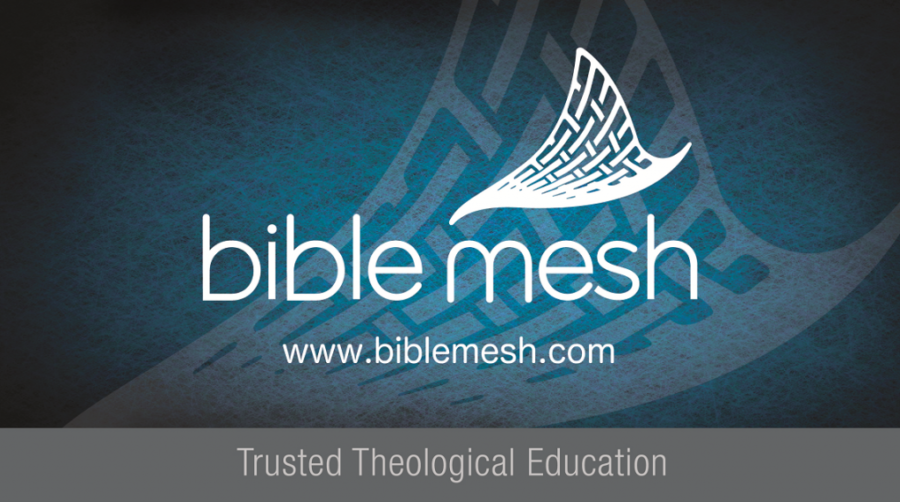It’s always good to talk to the person next to you on an airplane flight. You never know, you just may end up sitting next to the developer of a new state-of-the-art Bible software. This very thing happened to me on my flight to Milwaukee for this year’s annual meeting of the Evangelical Theological Society. During the flight I got to have a brief chat with Nicholas Ellis who helped develop BibleMesh. Because we missed a connecting flight – along with Dr. Timothy Edwards who is another key contributor to BibleMesh – we grabbed a taxi together and had the opportunity to chat further. I hadn’t heard of their software at the time, but seeing their display at ETS and SBL (and seeing their logo on this year’s free ETS tote bag) I knew they were for real and that they were developing something really interesting. So I decided to ask Nicholas Ellis a few questions about their software for the benefit of The Two Cities:
JAD: Briefly, what is BibleMesh?
NE: BibleMesh Biblical Languages is an online learning platform offering students courses in biblical Hebrew and Greek. These courses are primarily inductive in nature, placing the biblical text at the heart of the language learning experience. Level 1 Greek students will read and translate the first three chapters of the Gospel of John, and Level 1 Hebrew students will read and translate Jonah 1, 3–4 and all of Ruth. (Level 2 will follow in early 2013, with Levels 3 and 4 to follow soon afterwards.) Our method is that students learn grammar and vocabulary as they read the biblical text. The biblical text is always accompanied by an audio recording of the text, and every grammar article is accompanied by an instructional video that explains the topic clearly and concisely. As students progress, a reading guide helps students to navigate grammatical issues that have not yet been formally taught. As the course moves forward, the amount of information that appears in the reading guide is reduced so that students are increasingly reading the biblical text on their own. Students learn vocabulary by using a cloud-based, mobile-friendly vocabulary acquisition technology. This technology remembers what a student learns, when they learned it, and when it should be reviewed to ensure long-term memory retention. Each lesson tests the student on the vocabulary for the included verse as well as select grammar topics that have arisen in the verse. For ongoing consultation, all the grammar articles are contained in an accessible and fully searchable reference library.
JAD: Where does BibleMesh fit among other Bible software companies such as Accordance, Logos, and BibleWorks?
NE: BibleMesh Biblical Languages teaches students to read biblical Hebrew and Greek rather than being a textual or research tool. The aim of BibleMesh Biblical Languages is to produce independent readers of the biblical text who have a strong reading fluency, a thorough knowledge of the grammar of the biblical languages, as well as a large and versatile vocabulary that allows the student to read the biblical text without excessive reliance on lexical or grammatical aids.
JAD: Who is the ideal user of BibleMesh?
NE: Anyone who is interested in learning to read the Bible in the original languages and wants to do so quickly and with excellent comprehension. The course is academically rigorous and as such is suitable for use within institutions either as a stand-alone online course or as a class textbook. The course, however, is structured and communicated in such a way that we have had individuals from all walks of life testing the product and learning the biblical languages. We have seen highly educated professionals use it as well as home-educating high school students and retired people who are dedicated to studying the Bible. The courses work well for pastors, missionaries and Bible translators who desire to keep their knowledge of the biblical languages fresh.
JAD: How was the idea originally conceived?
NE: The desire of the BibleMesh foundation was to serve the Church by raising biblical literacy. As the foundation expanded its staffing and its technical team, the proposal was made to branch into biblical language education. A team of teachers and developers centered in Oxford, England, developed BibleMesh Biblical Language’s course structure and methodology as a way for language education to happen independently of formal teaching environments by using cutting-edge technology and pedagogical methods.
JAD: To the extent that you’re allowed to answer this, what sort of response have you received from organizations, institutions and individual scholars?
NE: The BibleMesh platform, including the Immerse: First Steps and Level 1 courses, was launched at the Evangelical Theological Society and the Society of Biblical Literature meetings in Milwaukee and Chicago, respectively, in November 2012. The response we received was extremely encouraging. Beyond the expected interest from individuals and institutions working in a purely online environment, numerous language professors from dozens of institutions expressed interest in using the platform as an in-class textbook, taking advantage of both the fresh approach to reading and grammar, as well as utilizing the extensive grade management and progress tracking features.
For more information check the BibleMesh Biblical Languages website: http://languages.biblemesh.com/index.php?route=common/home





1 Comment
Leave your reply.